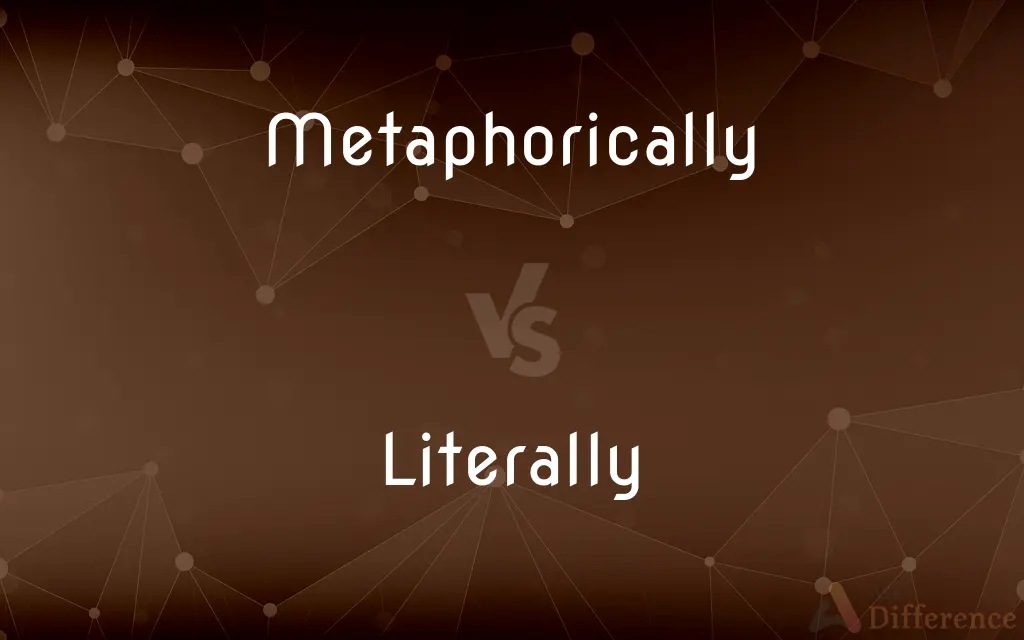Metaphorically vs. Literally — What's the Difference?
Edited by Tayyaba Rehman — By Maham Liaqat — Updated on April 14, 2024
"Metaphorically" involves using symbolic or figurative language to imply a likeness, while "literally" refers to the exact and real meaning of words without exaggeration or metaphor.

Difference Between Metaphorically and Literally
Table of Contents
ADVERTISEMENT
Key Differences
When someone speaks "metaphorically," they use language that symbolizes or represents ideas or concepts through analogy or symbolic representation, not intended to be taken as a direct factual statement. Conversely, when using the term "literally," the speaker emphasizes that the statement is true to fact, without exaggeration or deviation from reality.
Metaphorically allows for creative expression, enriching language by conveying emotions or abstract thoughts through familiar images or concepts. On the other hand, literally grounds conversation in reality, ensuring clarity and precision by adhering strictly to the facts or actual occurrences.
In everyday language, "metaphorically" enhances storytelling or explanations, providing depth and resonance through comparison (e.g., "He has a heart of stone"), whereas "literally" confirms the authenticity or seriousness of a statement (e.g., "It was literally freezing outside").
Misuse of "literally" can lead to confusion or unintentional humor, as it's often employed for emphasis in situations that are clearly metaphorical or hyperbolic (e.g., "I literally died of laughter"). This contrasts with "metaphorically," where the intention is always to draw non-literal comparisons.
Understanding the distinction is crucial in both written and spoken communication to avoid ambiguity. Using "metaphorically" appropriately can convey complex ideas succinctly and vividly, while "literally" is best used to assert undeniable facts or actual events.
ADVERTISEMENT
Comparison Chart
Definition
Using figures of speech to imply similarity
Adhering to the exact meaning of words
Purpose
To express ideas symbolically
To state facts without embellishment
Usage
Common in creative and expressive contexts
Used for clarity and emphasis in factual contexts
Example
"Breaking the ice"
"The ice on the road caused accidents"
Impact on Communication
Enhances emotional and abstract understanding
Ensures clarity and precision in conveying truths
Compare with Definitions
Metaphorically
Used to express complexity through simple comparisons.
They fought tooth and nail, metaphorically, to win the debate.
Literally
In a literal manner or sense; exactly.
The documentary literally transported her back to her childhood.
Metaphorically
Speaking in a way that uses symbolic figures of speech.
Metaphorically speaking, he is in hot water with his boss.
Literally
Often misused for emphasis in non-literal contexts.
I literally exploded with rage (incorrectly implies physical explosion).
Metaphorically
Helps convey emotions or abstract concepts.
He broke the chains of monotony, metaphorically, by traveling the world.
Literally
Used to emphasize the truth and accuracy of a statement.
He was literally the last person to leave the office.
Metaphorically
Enhances literary or spoken narratives by invoking imagery.
She saw the city as a jungle, metaphorically, where survival was for the fittest.
Literally
Clarifies that an expression or statement is true without exaggeration.
It was literally raining cats and dogs, referring to the intensity of the rain.
Metaphorically
Often contrasts with literal interpretations.
Saying he has an iron will, metaphorically, means he is very determined.
Literally
Differentiates actual events from figurative expressions.
He literally broke the record, meaning he actually surpassed the previous record.
Metaphorically
A figure of speech in which a word or phrase that ordinarily designates one thing is used to designate another, thus making an implicit comparison, as in "a sea of troubles" or "All the world's a stage" (Shakespeare).
Literally
In a literal manner or sense; exactly
The driver took it literally when asked to go straight over the roundabout
Tiramisu, literally translated ‘pull-me-up’
Metaphorically
One thing conceived as representing another; a symbol
"Hollywood has always been an irresistible, prefabricated metaphor for the crass, the materialistic, the shallow, and the craven" (Neal Gabler).
Literally
In a literal manner; word for word
Translated the Greek passage literally.
Metaphorically
(manner) In a metaphoric manner; not literally; by means of metaphor.
He conveyed his teachings metaphorically.
Literally
In a literal or strict sense
Don't take my remarks literally.
Metaphorically
Used to draw attention that what follows is a metaphor, not to be taken literally
Metaphorically, he was crushed.
Literally
Actually; in effect; practically. Used as an intensive to emphasize a figurative statement in an exaggerated way
“There are people in the world who literally do not know how to boil water” (Craig Claiborne). I was so angry that my heart literally exploded with rage.
Metaphorically
In a metaphorical manner;
She expressed herself metaphorically
Literally
Word for word; not figuratively; not as an idiom or metaphor.
When I saw on the news that there would be no school tomorrow because of the snowstorm, I literally jumped for joy, and hit my head on the ceiling fan.
Literally
Used non-literally as an intensifier for figurative statements: virtually, so to speak (often considered incorrect; see usage notes)
He was so surprised, he literally jumped twenty feet in the air.
My daughter's pet rabbit had babies, and now we've literally got rabbits coming out of our ears.
On 9/11 people were literally glued to their TV sets.
Literally
(colloquial) Used to intensify or dramatize non-figurative statements.
I had no idea, so I was literally guessing.
I was literally having breakfast when she arrived.
She was literally like, "What?", and I was literally like, "Yeah".
Literally who is this?
Literally
(colloquial) Used as a generic downtoner: just, merely.
It's not even hard to make—you literally just put it in the microwave for five minutes and it's done.
It won't take me long to get back, cause the store's literally two blocks away.
Literally
According to the primary and natural import of words; not figuratively; as, a man and his wife can not be literally one flesh.
Literally
With close adherence to words; word by word.
So wild and ungovernable a poet can not be translated literally.
Literally
In a literal sense;
Literally translated
He said so literally
Literally
(intensifier before a figurative expression) without exaggeration;
Our eyes were literally pinned to TV during the Gulf war
Common Curiosities
How does using "metaphorically" affect communication?
Using "metaphorically" enhances communication by adding depth and emotional resonance, allowing for abstract or complex ideas to be conveyed more vividly and engagingly.
Can "literally" be used for emphasis in a figurative sense?
While commonly done in casual speech, using "literally" to emphasize figurative statements can confuse and is generally considered incorrect in formal contexts.
Is it incorrect to mix up 'literally' and 'metaphorically'?
Yes, mixing these up can lead to misunderstandings, as "literally" grounds statements in fact, while "metaphorically" suggests symbolic or figurative interpretation.
Why is it important to understand the difference between 'literally' and 'metaphorically'?
Understanding the difference is crucial for accurate communication. Misusing these terms can lead to confusion or misinterpretation of the intent and truthfulness of a statement.
What does it mean to speak metaphorically?
To speak metaphorically means to use figures of speech that symbolize or imply a likeness, not intended to be taken literally.
When should I use "literally" in a sentence?
Use "literally" to emphasize that something is true exactly as stated, without exaggeration or metaphor, especially to highlight the reality of an expression that could otherwise be seen as hyperbolic.
Can using 'literally' in a metaphorical sense be acceptable?
In informal speech, using 'literally' in a metaphorical sense has become widely accepted to add dramatic emphasis, though it's often criticized in more formal or traditional linguistic contexts.
Are there any languages where the distinction between 'literally' and 'metaphorically' is less significant?
In many languages, especially those rich in idiomatic expressions, the boundary between literal and metaphorical meanings can be fluid, but in formal and academic contexts, the distinction is usually significant across languages.
What are some common examples of metaphors?
Common metaphors include phrases like "time is money," "the world is a stage," or "he has a heart of gold." These expressions convey complex ideas or emotions through symbolic language.
How can I tell if a statement is meant to be taken metaphorically?
A statement is likely metaphorical if it involves unlikely comparisons or exaggerations that don’t make sense literally, such as "drowning in paperwork." Context and tone can also indicate metaphorical use.
Share Your Discovery

Previous Comparison
Wiki vs. Blog
Next Comparison
Quartz vs. FeldsparAuthor Spotlight
Written by
Maham LiaqatEdited by
Tayyaba RehmanTayyaba Rehman is a distinguished writer, currently serving as a primary contributor to askdifference.com. As a researcher in semantics and etymology, Tayyaba's passion for the complexity of languages and their distinctions has found a perfect home on the platform. Tayyaba delves into the intricacies of language, distinguishing between commonly confused words and phrases, thereby providing clarity for readers worldwide.
















































